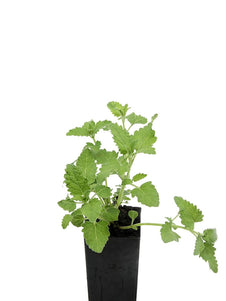
Catmint - Six Hills Giant Catmint
Catmint - Six Hills Giant Catmint

- Low stock - 20 items left
- Inventory on the way

Usually available: All year
Life cycle: Perennial
Height: 70cm
Position: Full sun
Soil preference: Well drained
This is how we pack and send your Herb Plants to all states except TAS & WA
You will receive
- 1 Six Hills Giant Catmint Herb Plant in a 50 X 75mm tube - General growing instructions
All of our Herb Plants are grown organically with certified organic potting mixes and fertilizers
Botanical Name: Nepeta x racemosa
Catmint ‘Six Hills Giant’ is a large and upright herbaceous plant, growing to 70cm by 100 cm wide. The branches spread out creating a mound, topped with mauve coloured flower stalks over summer. The grey –green foliage is aromatic and provides a nice backdrop to the tall flower stalks. The flowers are small, but numerous and appear to be shaped like trumpets. They appear in spring and summer, providing a food source for bees and butterflies. A second round of flowering can be encouraged, creating a long blooming season. This catmint is said to be the longest flowering variety.
This plant requires space to grow properly and can be a very showy plant with its attractive flower stalks. If several are planted together they will form a large and dense groundcover. The plant has a branching habit that cause the branches to lean out from the centre, so it may be useful to use a ring support or to tie them back or together. It is a good partner to roses and suits cottage gardens.
The parent plants are Nepeta racemosa and Nepeta nepitella, but it may also be listed with the botanical name Nepeta mussinii or Nepeta faassenii. It may be necessary to check that the plant is a large growing catmint to be sure you have the correct plant given the variety of names or labels.
Growing Conditions
This vigorous catmint is considered to be drought tolerant and quite hardy. It will tolerate part shade, but full sun is preferred. Some moisture or damp soil is tolerated, unlike most catmints. However, all soil types must be well drained and dry soil is quite acceptable. The soil does not need to be especially fertile or enriched. If the ground or weather is too damp or the soil to rich the plant may tend towards droopiness. ‘Six Hills Giant’ may be semi-deciduous depending upon the area.
Flowering is in spring and summer, but the plant may be cut back after the summer flowering to encourage a second blooming period in autumn. ‘Six Hills Giant’ is a hybrid plant so it does not self seed. It may be propagated by division or by taking softwood cuttings. Dividing the plant every few years also helps to revitalise the plant. Although the plant may spread a little, this is due to branching rather than underground rhizome spread.
Medicinal Uses
The catnips and catmints have an interesting history of medicinal use, which may be found on the Catnip and Catmint pages.
Other Uses
Cats may respond to the chemicals in Catmints like Six Hills Giant. However, the Catnips are more likely to elicit a reaction from cats. For more details see our Catnip and Catmint pages.
All information provided on this website is for informational purposes only. Please seek professional advice before commencing any treatment.




